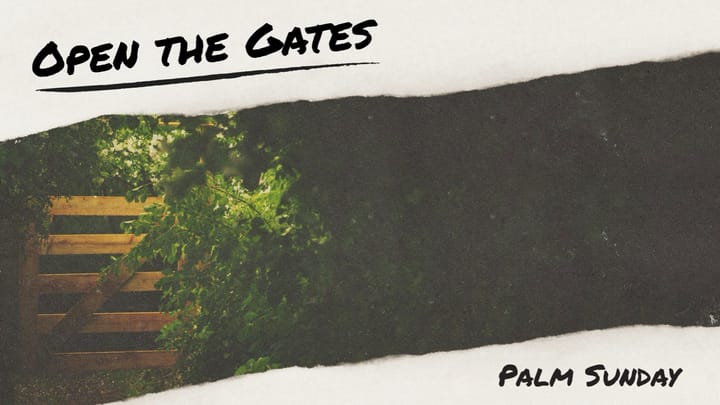Fairhaven Sermon 9-29-2024

In this week's service, Rev. Dylan Parson reflects on the themes of James 5:13-18, where Jesus tells us to pray for each other if we are sick or in trouble. The Pastor notes that many of us struggle with praying regularly, often making it a habit only during times of crisis rather than incorporating it into our daily lives. He shares his own struggles with this issue, acknowledging the physical and emotional blockages that prevent him from praying as much as he wants to.
Rev. Parson uses the example of the movie Elf to illustrate how our actions and words must align with what's in our hearts if we're truly following Jesus. Just as singing Christmas carols in Central Park brings joy and magic, our prayers can bring healing and transformation when spoken from a place of faith and trust. The Pastor reminds us that prayer is not just about asking God for things, but also about offering it to others in need. He encourages his congregation to make prayer a priority, acknowledging that God's power and love are always available to those who would seek them out. By doing so, we can live out our faith in practical ways and experience the transformative power of Jesus' love.
Transcript
So, I hate this whole thing that's gotten really common in the past like five years or so, where we just jump ahead seasons faster than we ever have in the past. Now, I can't stand that there's been Halloween stuff in the dollar store since July. I've seen the occasional Facebook post counting down till Christmas since like last December 27th. It drives me nuts.
So that being said, I would ask you to bear with me for a minute here as I do that myself. Most of you, I imagine, have seen the movie Elf, right? Who has seen the movie Elf? Okay. So, I would argue that's the Christmas classic of my generation, right? So it's the millennial equivalent of the Baby Boomers had a Charlie Brown Christmas, right? Gen X had a Christmas story. We got Elf.
It came out when I was nine, so that was a prime age to get a lifelong attachment to a Christmas movie. Nothing else for people my age except for maybe the Mike Myers Grinch movie really comes close. That one's good too. But in case you haven't seen it, long story short of the movie Elf.
So there's this six foot tall elf. He spent his life working at the North Pole and discovers as an adult that he is actually not an elf, but was adopted. This elf whose name is Buddy goes to New York City hoping to find his real dad, which he does, but eventually ends up needing to save Christmas, 'cause this is a Christmas movie, right? When Santa's sleigh crashes in Central Park. And you see Santa's sleigh runs on the power of Christmas spirit and it can't get off the ground without jet engines now because so few people believe anymore.
And so all these local news reporters have gone to Central Park to figure out what's going on and Buddy's brother and girlfriend get on camera for all the local news and remind people that the best way to spread Christmas cheer is singing loud for all to hear. And so they lead the people in caroling. They sing Santa Claus is coming to town and the moment whenever Buddy's grouchy dad reluctantly joins into the song, that's the moment that Santa's sleigh springs to life and lifts off to fly away. And finally, the Christmas spirit is revived in the hearts of countless New Yorkers.
Christmas is saved. Santa's able to fly all around the world just in time. The best way to spread Christmas cheer is singing loud for all to hear. And it turns out that that works.
The people actually leaning into what they believed or hoped to believe deep down in their hearts enables the magic to happen. They believe in Santa. They believe in Christmas. And so whenever they sing, whenever they put it out into the world, then it happens.
And so here we are in a very different story, the fifth chapter of James. And I have to say that throughout this month-long journey through James, we've been in James now for about a month, the Holy Spirit keeps pointing me to a very similar theme with every passage. And I've said it every Sunday now, but here it is once again. James is concerned above all with closing the gap between what we believe and what we do.
A couple of weeks ago, we talked about how this manifests with regard to the tongue, you know, what we speak, what we write, what we say. And all of us struggle and we'll fight our whole lives with the deadly poison of our mouths, James calls it, speaking evil and hate and conflict and division into the world, even though we believe in Jesus who calls us to do the opposite of those things. But God offers us a different way through his power to transform us from the inside out and James is clear about the tongue. What comes out of your mouth must reflect what's in your heart if you're faithfully pursuing life in Christ.
James also tells us the same about a lot of our other actions. He opened the book of James talking about how we should be slow to anger, slow to speak, quick to listen. We should be humble. We should avoid immoral things.
We should avoid wickedness while instead welcoming what James calls the word planted deep inside us, the very word that is able to save us. So what's on the inside should really be readily visible on the outside or else we should be examining whether we're really welcoming Jesus into our hearts or whether we're deceiving ourselves. This is the whole point of James, matching the inside and the outside. So not to be too cheesy with this example here, but think about Elf, right? You imagine all those people gathered in Central Park that Christmas Eve, thought Santa was well and good.
They're probably even looking forward to Christmas towards all the presents of the morning, towards this beautiful day with family that is to come, but only whenever their voices erupt in song does the magic happen, so to speak. The heart, the body, and the voice connect and once they're in alignment, things are transformed not before, but once every part of the people comes together. God is not Santa to be clear. God does not work much like Santa.
He doesn't just give gifts to good boys and girls, punish the naughty. That's not what God does, right? Things are a little more complicated. God isn't just a dispenser of gifts to the well-behaved. God is God.
But like those cheerful carolers helping to get Santa's sleigh off the ground by allowing Christmas magic to flow, right? The situation for us is changed when we decide to get active with what we believe. When we decide to jump into it and live as if God is actually real and at work in our lives. So here's James again. If any of you are suffering, they should pray.
If any of you are happy, they should sing. If any of you are sick, they should call for the elders of the church and the elders should pray over them, anointing them with oil in the name of the Lord. Prayer that comes from faith will heal the sick, for the Lord will restore them to health. And if they have sinned, they will be forgiven.
For this reason, confess your sins to each other and pray for each other that you may be healed. The prayer of a righteous person is powerful in what it can achieve. But do you believe it, right? I'm struck often by the distance between what we think we believe about prayer and the reality of how we tend to actually live it out. So I'll be the first to acknowledge this in myself.
I mean, I know that I have this problem. I know very well that there is nothing better for me than to sit down and start the day, lighten a candle, moving through my daily prayer book that I love, the daily reading in that. And yet I find myself maintaining this habit for a season. Lent was great.
And then it fades away. And this is despite knowing that it works. And honestly, this year, receiving more obvious responses to prayer than I've ever had in my life, I felt it, I know it works, I enjoy doing it, and yet it fades. Meanwhile, I know that prayer when I'm sick or when I'm in trouble helps.
Again, I had a pretty dramatic experience with that a few months back too. These are new things for me. And yet when I'm sick, when I'm hurting, I take ibuprofen more frequently than I pray about it. And of course I should be doing both.
And you know, call me Pentecostal, biblical, crazy, but I know that prayer can cast out demons and I've seen that happen. And yet I don't find myself attempting that all that often either. Well why not, right? I don't fully know. I don't know why I don't behave this way.
And maybe, I bet, you're like me. Maybe sometimes you find it hard to muster up the will to pray as if it's something that takes any effort at all compared to literally anything else we do on a daily basis. How hard is it to pray? You don't even have to do anything out loud. My experience is almost as if I have like a physical block preventing it sometimes.
You want to do it, but you can't. The same way it's hard to lace up your shoes and go out running or just go exercising. It's this mixture of I should do it, I want to do it, but also I really, really, really don't want to. And the reason for this of course is our fallen nature.
We can know and we can understand what's good, but our wills are warped such that it's a whole different thing to actually do it. You can know it, but doing it's another thing. I'm reminded of the Apostle Paul's words from Romans chapter 7. I know that good doesn't live in me, that is in my body.
The desire to do good is inside of me, but I can't do it. I don't do the good that I want to do, but I do the evil that I don't want to do. But if I do the very thing that I don't want to do, then I'm not the one doing it anymore. Instead it is the sin that lives in me that is doing it.
And that sounds exactly right to me in this scenario. It takes the grace of God to allow us to overcome this ailment that stands in the way of all God has to offer us and wants to give us. We have to turn to God even to turn to God. Left to our own devices, we're caught up in self-centeredness, we're caught up in pride, which are frankly almost always the root causes of our problems, but especially here the unwillingness to pray.
Think about this. I can handle it myself after all. I don't need God to relieve me from my suffering. I'm strong enough, I can handle it.
I don't need to sing praises or thanks to God for my blessings. I earned the good stuff in my life all by myself. I can keep on doing it. And I'm certainly not going to ask other people to pray for me.
That's kind of embarrassing. And on the other end of things, for those who are the givers of prayer rather than the receivers of prayer, we're just as hesitant to pray for other people in their need because we think, Who am I to do that? I don't know what I'm doing. They should be asking somebody who's good at praying, who can whip up a really good one that sounds nice, that's got a little bit more power. And if anything, maybe we should call the pastor to do it.
Of course, I'm always glad to, but you know what I mean. Jesus is calling us to overcome this hesitation on either side, whether you're receiving the prayer or need it, or whether you are in the position to offer it. Go to God, pray, ask one another to pray, pray together. What good, think about it this way, what good is the most powerful medicine in the world able to heal us and others from sin and sickness, whatever else ails us and keeps us away from God, if we just leave that medicine in the cabinet? It's there, it might do wonderful things for us, but if you don't pick it up, what is the point? There is a power that is ours for the taking, that is available to be used.
God wants to work within us and alongside us if we want the same thing. God's just waiting for us to come get it. And that's the most scary and amazing thing about the way God works in the world. He doesn't just do it by himself, we're invited to have an active role in it.
So take your belief in the power of Jesus and in prayer and get it out of just your head and put it into practice. That's what James is saying. If you're suffering, pray. If you're happy, pray.
If you're sick in your mind, in your body, or your spirit, pray. And ask your siblings in Christ to pray over you. That's something we don't do all that often. James gives us this really beautiful, powerful example.
The prophet Elijah was a moral person, just like us, and when he prayed really hard that it wouldn't rain, no rain fell for three and a half years. And then he prayed for it to rain again, and God sent rain immediately. Elijah was a prophet, but he was just a person. The prayer of a righteous person can do that, just as much now as it could then.
So why not pray? It's easy to just lose track of it, to lose track of it as a priority in the busyness of life, whenever we're too focused on handling things on our own. It's no wonder opening a meeting or a meal with prayer becomes habitual at best. It's not often a real moment to ask God to bless our time to do something. This summer at annual conference, I was shocked, but I shouldn't have been, to find out that one of my favorite parts of conference, the prayer room, they always have this elaborate prayer room, was down to basically four people running it in the aftermath of all the chaos of disaffiliation.
So everyone does this, pastors, professional church people, everyone loses track of prayer. And we shouldn't feel guilty about that, but God is always waiting for us to come back. This power beyond our ability, beyond our imagining is waiting for us. We affirm every Sunday, we say the Apostles' Creed, that Jesus rose from the dead, that Jesus conquered death itself.
We hear from scripture about him casting out demons, about him healing countless people, turning lives upside down. So let's ask him to do it now. The best way to believe in Jesus is to live like he's alive today. In the name of the Father, and the Son, and the Holy Spirit.
Amen.


